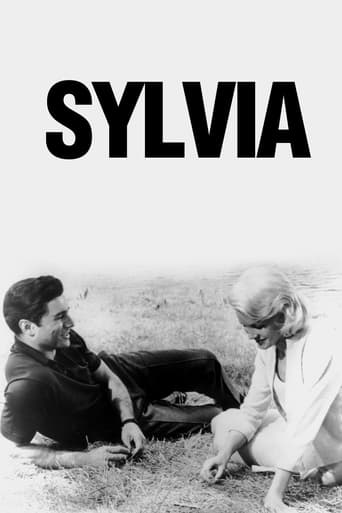

Sylvia (1965)A movie far out of its time, yet ahead of its genre. By 1965 this kind of small black and white film had migrated to television productions, or had disappeared. While clearly low budget without any stars, it keeps a tight formal structure and strong production throughout. And the idea, gradually piecing together someone's identity, makes for a great movie.Even if it does borrow, in terms of structure only, from "Citizen Kane," no less. That is, an investigator is set off to learn who the real Sylvia is, and by meeting with one important contact after another, and going through a series of well done flashbacks, we are able to piece together the complicated life of the title character. The biggest difference from Kane (besides virtuosic style) is that Sylvia is an ordinary person. Or she seems ordinary until you learn in stages the nuances and integrity of her survival.There are many things left unanswered, and I'm not sure that's totally for the best. We never quite understand her meandering through dramatic (and noble) moments one after another. What kind of childhood set her off this way ("Kane," significantly, pivoted around a childhood event). Sylvia is a construction, apparently beautiful (in movie terms), but more importantly interesting, strong, independent. A great role model.The investigator, called Mack, is played by George Maharis, who has a steady and calm approach all through. What happens after the establishment of his role is really terrific, because each person he encounters offers a new scenario, a new setting and story and conversation, and then a new flashback. And some of these side characters are fabulous true characters. So you get captivated time and after time. In some ways the least interesting character is this hopeless perfect and yet tainted paradigm, Sylvia, who by the end gets her own long segment, a present tense adjustment of all of what we've seen so far.It's a little stilted at times, and the patient pace isn't always a benefit. The ending might actually seem a bit inevitable, too, which is fair enough. But in the big view you almost want to see it again to catch some of the piece you might have missed. It's filmed a decade after the last great noirs, and so isn't a big in the mode (though some people throw every b&w movie into the mix if they have a loner guy and a blonde). And it is a terrific tonic to the bigger Hollywood machine made stuff coming out in widescreen color (a lot of it). But when you see the changes in the medium with "Who's Afraid of Virginia Woolf" and so on the next year or two, it's really really old fashioned. Check it out.
... View MoreTracking down a copy of SYLVIA was kind of like the Maharis character's attempt to unearth facts about the main character. I finally found a copy and watched it tonight and was mildly impressed overall, very impressed with parts of the film, and unimpressed with other parts. It's an episodic sort of movie, as Maharis's detective goes from Pennsylvania to Mexico to New York to Los Angeles to piece together the background of Carroll Baker's "Sylvia". The supporting cast is terrific, as has been noted by other IMDb contributors. Then there are the flashbacks themselves which are less satisfying. I don't think this is Carroll Baker's fault at all, really. Maybe I am prejudiced since I adore Ms. Baker even when her acting isn't "spot on." Where I think the film flounders is in the way it doesn't avail itself of the kind of subjectivity that a film like CITIZEN KANE investigated. Each of the people Maharis interviews tells a part of Sylvia's life from his/her own perspective. Unfortunately the direction is fairly straight- forward, uninteresting, and doesn't adequately reflect each storyteller's own agenda or personal perspective. That would have made the flashback sequences much more interesting and provocative, and given Baker a bit more "meat" to her role as the enigmatic Sylvia since we would be seeing her -- literally -- through the eyes of the person recounting her life at that point in the film. The flashbacks in SYLVIA are simply that: flashbacks, and nothing more. Because the film is so simplistic, we automatically trust what each character is telling us about Sylvia and the flashbacks themselves are gospel truths. After a while the formula of Maharis meeting a new person from Sylvia's life and the flashback convention starts to get a bit tedious. On the other hand, as the film advances we get some great character performances from Ann Sothern, Viveca Lidfors, and Nancy Kovack (among others). Paul Gilbert as Lola Diamond is a hoot, and Lloyd Bochner and Aldo Ray are sinister adversaries as the men who rape Sylvia. The film feels like it wants to be LAURA but never quite achieves the same spellbinding quality, perhaps because there's no murder mystery which would have given the audience a nice bit of suspense to cope with (just the threat of scandal, which was admittedly more damaging a liability in the 60s than it is today; heck, today an author might thrive on scandal if it sold more copies of her book!). I felt a big "so what" about the unsurprisingly scandalous past of Sylvia. We already know that Sylvia made good on her own, and doesn't really "need" the financial assistance of the Peter Lawford character. There is very little to get worked up about, except perhaps what handsome Mack may do with all his sordid information. And, naturally, it's inevitable he should meet and fall in love with Sylvia. That would seem to me to be a good potential departure point for something exciting, and certainly more interesting than what happens next. What the film doesn't explore very well is how much Sylvia seems to need approval, and how empty she is emotionally (evidently using her reading as a form of escape from reality). As much as Baker tries to fill in the blanks in the script for us with a sympathetic performance, we don't really ever get a deep enough look beneath the surface of Sylvia, or get into her head. All the evidence is hearsay, circumstantial, and very little comes from Sylvia herself. Mack even stops Sylvia from pouring her soul out to him, which is unfortunate because it would have given Baker an incredible monologue to chew on as she dragged up every dark aspect of her past and corroborated what we had seen (would have been a nice recap, as well). I wanted to really like this movie more, even as camp, but found myself only mildly entertained. I think the ending is a real let down. It would have helped if there had been more to the conflict than just the exposure of scandal. The happy ending felt tacked-on and rushed, especially. All this is not to say that I think SYLIVA a bad film or Baker not good in it. Quite the contrary. I think the film has some precious moments indeed, but that as a good vehicle for Baker it is somewhat of a missed opportunity.
... View MoreThe filmic trope of presenting a mystery woman to the viewer through the recollections of her friends and lovers has a long history. Perhaps "Laura" is the most famous. A much lesser-known one is the British "Woman in Question." "Sylvia" is in that tradition: a wealthy man wants to find out about the background of his fiancée, Sylvia, so hires a private detective to investigate. As the P.I. encounters people from Sylvia's past, the stories that they tell him are the flashback elements of the film. There's a very touching episode with Viveca Lindfors, as well as one with Ann Sothern. While the film is somewhat desultory in its pacing, it's got some great folks-Edmund O'Brien, Joanne Dru, etc.--and a suitably disengaged performance from Carroll Baker in the title role. It actually works well for the character, who throughout a series of tawdry experiences has kept a part of herself removed and untouched. We also get to see a well-toned George Maharis with his pajama top off--another reason to catch the film if it ever shows up.David Raksin, who composed the score for "Laura," some twenty years earlier, provides a nice score for "Sylvia" (note the use of the waltz from William Wyler's "Carrie"--also a Paramount film-- in the scene at the restaurant with Sothern and Maharis).
... View MoreThe best thing about this movie is the truly first-rate supporting cast: Peter Lawford, Viveca Lindfors, Aldo Ray and Ann Sothern all give outstanding performances. Ann's, in particular, will stay with you long after the movie is over. She's a gem!
... View More